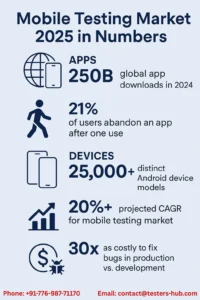Mobile App Testing Market in 2025: Why Outsourcing QA Is Gaining Ground
Apps Dominate 2025 – But Quality Makes or Breaks Them
Mobile apps aren’t just add-ons anymore—they’re the core of how businesses connect with people. In 2025, global downloads have crossed the hundreds of billions, and people spend nearly five hours a day glued to their phones. Yet despite the massive opportunity, the reality is brutal: if an app crashes once or loads slowly, users rarely give it a second chance.
This is why mobile app testing services are seeing rapid growth. And instead of handling QA internally, more companies are realising that outsourcing delivers the flexibility and expertise they need.
👉 Want fewer app crashes and better reviews?
The Market in Numbers: Why Testing Is Non-Negotiable
Several figures show how high the stakes are:
- Analysts expect the mobile QA industry to keep growing at double-digit rates through 2028.
- Device diversity is exploding—Android alone has tens of thousands of active models, plus multiple iOS versions.
- A poor first impression is deadly: most people delete an app within days if it crashes or feels sluggish.
- Bugs left unfixed during development cost only a fraction to repair compared to those discovered after launch.
These numbers all point to the same conclusion: if you skip proper testing, you pay for it later—in money, reputation, and lost users.
👉 Check our for proven solutions.
Why Outsourcing QA Is the Smarter Play
Outsourcing isn’t just about reducing payroll—it solves problems that in-house setups can’t always handle.
Cost Balance
A single QA engineer in North America can cost upwards of six figures per year. Outsourcing typically trims that by nearly half, while still bringing in senior-level expertise.
Faster Launches
Outsourced teams scale up or down as projects demand, helping companies release features weeks faster than relying only on fixed internal resources.
Real Device Labs
Instead of buying and maintaining dozens of test devices, businesses can tap into partner labs already stocked with the latest phones, tablets, and OS versions.
Industry Experience
Healthcare apps, fintech platforms, or gaming products all face unique challenges. Outsourced QA teams bring experience from these sectors, spotting issues that generic testers might overlook.
👉 Want expert coverage without the overhead?
A Quick Example: From Struggling to Stable
One startup behind a wellness app in the US was facing constant 1-star reviews due to crashes on older Android phones. After outsourcing QA, crash rates dropped by almost four-fifths within two release cycles. More importantly, app store ratings jumped from the low 3s to above 4.5. Outsourcing turned a reputation problem into a growth story.
The Trends Driving QA Outsourcing in 2025
So why is this shift happening now? A few trends explain it:
- Testing earlier in development reduces last-minute delays.
- Automation tools now handle a large portion of repetitive checks, cutting regression times dramatically.
- AI insights help testers prioritize where bugs are most likely to appear.
- Security rules like GDPR and HIPAA are forcing companies to test more thoroughly than ever before.
- Global outsourcing hubs such as India and Eastern Europe provide skilled QA specialists at scale.
👉 Stay on top of these trends.
Wrapping Up: The Future Points to Outsourcing
By the end of this year, most mid-sized and enterprise-level companies will outsource at least part of their QA. Why? Because it works. Outsourcing brings cost savings, faster time to market, device coverage, and industry expertise all in one package.
In an app economy where one bad review can sink your ratings, testing is not optional—and outsourcing is often the smartest way to get it done right.
👉 Want to make your app launch a success story?
FAQs
Q1. Why are more companies outsourcing QA in 2025?
Because it combines cost savings with expert coverage and wider device testing.
Q2. Which tests are most often outsourced?
Functional, regression, performance, usability, and security testing are the top choices.
Q3. Can outsourcing handle sensitive data apps?
Yes. Trusted providers work under NDAs and follow strict compliance standards.
Q4. How quickly can testing begin after outsourcing?
In most cases, QA teams can start in less than a week.
Q5. Will outsourcing mean less control?
Not at all—daily reports, clear defect logs, and regular updates keep companies in the loop.











